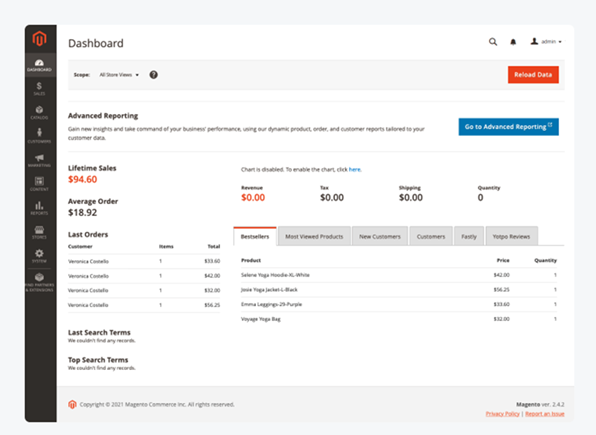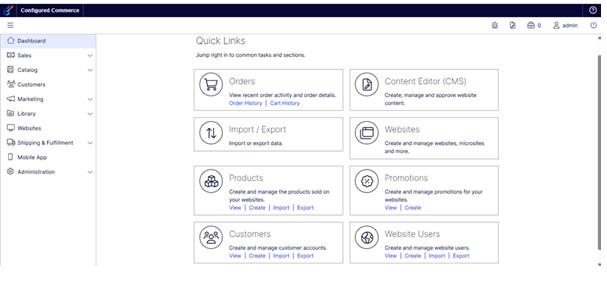Nowadays, as businesses choose the right ecommerce platform, it is challenging, but selecting the right platform is a crucial decision for any business that wants to grow online. Two very popular platforms are discussed in this blog. I am comparing two e-commerce technologies, specifically Magento (Adobe Commerce) and Optimizely Configured Commerce, in terms of their technology features.
Magento and Optimizely Configured Commerce are widely used e-commerce platforms and content management systems (CMS) that allow businesses to build and manage online stores. Both have different technologies, features, and serve different business purposes. This blog helps us choose e-commerce platforms
Two popular choices are:
- Magento (Adobe Commerce) – Flexible and works for both B2C and B2B.
- Optimizely Configured Commerce – Explicitly built for B2B.
Both are powerful, but they serve different needs. Let’s break them down so you can decide which fits you best.
Magento (Adobe Commerce)
Magento is a popular open-source eCommerce platform. Magento, now known as Adobe Commerce, is a leading e-commerce platform acquired by Adobe in 2018. It offers powerful, customizable tools for building and managing online stores, supporting both B2C and B2B models. With rich out-of-the-box features, seamless integrations, and scalable architecture, Adobe Commerce helps businesses deliver exceptional shopping experiences.
Why Businesses Choose Magento
- Almost everything can be customized – design, features, and workflows.
- Packed with tools for products, payments, shipping, and marketing.
- Works well for both small and large businesses.
- Huge global developer community.
Magento offers two versions: Magento Open Source and Adobe Commerce. Actually, Magento Open Source is ideal for developers and small businesses that want complete control and flexibility without licensing costs. Adobe Commerce, on the other hand, is built for enterprises that need advanced features, scalability, and integration with Adobe’s ecosystem.
Magento Open Source
Magento Open Source is free, fully customizable, and has a plethora of extensions available on the Magento (Adobe Commerce) Marketplace. Smaller companies and those who are just entering the e-commerce field find it a significant advantage that the platform is free, allowing them to start developing their store with no upfront platform costs. If they need to add more features and functionalities, they can easily do so by using extensions from the marketplace, many of which are also free. And because Magento Open Source can easily be expanded with new features, medium-sized companies also consider it an ideal platform for their needs.
Adobe Commerce
Adobe Commerce is the enterprise edition of Magento Open Source, a fully featured, subscription-based eCommerce solution from Adobe. It comes with advanced features out of the box, but it is also fully customizable and easily integrates with third-party extensions. Large businesses that require those advanced capabilities, value 24/7 customer support, and want the option for cloud infrastructure opt for Adobe Commerce. The platform is robust, scalable, and secure, and allows eCommerce companies to manage multiple brands, currencies, and geographies from a single platform. Adobe Commerce supports both B2C and B2B business models.
Please see the screenshot of the Magento (Adobe Commerce) Dashboard.

Optimizely Configured Commerce Cloud
Optimizely Configured Commerce is a cloud-based B2B eCommerce platform designed specifically for manufacturers, distributors, and wholesalers. It helps businesses sell complex products and services online while managing customer-specific pricing, product configurations, and ordering workflows.
History of Optimizely Configured Commerce
Optimizely Configured Commerce, known initially as Insite Software, was designed for B2B e-commerce, focusing on extensive product catalogs, complex pricing, and ERP integration.
In 2020, it became part of Episerver, and in 2021, the company rebranded to Optimizely. The platform moved to the cloud, got stronger personalization tools, and adopted an API-first approach.
Who it’s for: Manufacturers, distributors, and wholesalers with complex ordering processes.
Why Businesses Choose Optimizely
- Built-in personalization and product recommendations.
- Advanced B2B account features (contract pricing, order approvals).
- Real-time ERP integration.
- Mobile-friendly and API-ready.
- Fast, intelligent search.
There are two options available to use Optimizely Configured Commerce: the SDK (Software Development Kit) and Cloud, which is fully managed by Optimizely and is explained in short below.
SDK (Software Development Kit) – For companies that want complete control
- Build and test locally.
- Ideal for custom integrations and workflows.
- Best for unique business needs.
Cloud – Fully managed by Optimizely
- No server maintenance.
- Automatic scaling and updates.
- Focus on running your business, not the tech.
If you want to understand comparison more in detail, please read the full blog Difference Between Optimizely Configured Commerce SDK and Cloud
Optimizely Configured Commerce includes a built-in CMS for adding and managing pages and content. It offers two options: Classic CMS, which is older and based on AngularJS, and Spire, which is newer and built on React.js. Spire is faster, easier to use, and simpler to update. For more details, please read the blog Optimizely Configured Commerce in-built CMS Details
Please see the screenshot of Optimizely Configured Commerce Admin Dashboard.

Magento (Adobe Commerce) vs Optimizely Configured Commerce – Feature Comparison
| Feature | Magento (Adobe Commerce) | Optimizely Configured Commerce |
|---|---|---|
| Primary Focus | B2C eCommerce (also supports B2B) | B2B eCommerce |
| Architecture | PHP-based, open-source (Magento Open Source) & cloud-hosted (Adobe Commerce Cloud) | .NET-based, cloud-hosted SaaS solution |
| Hosting | Self-hosted or Adobe Cloud | SDK and cloud hosting |
| Customization | Highly customizable with extensions/themes | Highly customizable with SDK, APIs, and extension points |
| Ease of Use | Flexible but requires strong technical skills to manage and customize | Business-user-friendly with admin tools and less reliance on heavy coding |
| B2B Features | Available but often needs extensions (quotes, company accounts, pricing rules) | Built-in advanced B2B features (quotes, requisitions, approval workflows, budgets) |
| B2C Features | Strong B2C marketing & merchandising tools | Good B2C capabilities, but B2B is the primary strength |
| Multi-Site Management | Supports multiple stores, brands, languages, and currencies | Superior multi-site and multi-region support |
Technology Stack Comparison – Magento (Adobe Commerce) vs Optimizely Configured Commerce
| Category | Magento (Adobe Commerce) | Optimizely Configured Commerce |
|---|---|---|
| Programming Language | PHP | C# (.NET) |
| Framework | MVVC | ASP.NET Core / .NET Framework |
| Database | MySQL | Microsoft SQL Server (Azure SQL in SaaS) |
| Caching | Redis (in-memory cache) and Varnish (full-page cache) | In-memory caching and distributed caching via Redis |
| Search | Elasticsearch / OpenSearch | Elasticsearch and Google Search |
| Message Handling | RabbitMQ for asynchronous processing | Event-based integration jobs and Scheduled tasks |
| Dependency Management | Composer (PHP dependency manager) | NuGet Package |
| Integration | Marketplace extensions or custom ERP/CRM integrations | Built-in ERP and CRM connectors with real-time sync |
Frontend Technology Comparison
| Category | Magento (Adobe Commerce) | Optimizely Configured Commerce |
|---|---|---|
| Frontend Framework | Knockout.js (default), PWA Studio, Hyvä Theme for headless | React-based SPA |
| Templating Engine | .phtml files with PHP | Razor views (.cshtml) & DotLiquid for Classic CMS |
| Customization | XML layout updates and UI components | React components, Custom Razor views, AngularJS components for classic |
| Theme Management | Magento themes and Hyvä Theme for headless | Optimizely themes – Classic and Spire |
Architecture Comparison
| Category | Magento (Adobe Commerce) | Optimizely Configured Commerce |
|---|---|---|
| Architecture Style | MVVC with service contracts | Headless-ready APIs-based architecture |
| Extensibility | Plugins, observers, DI containers | Extension points, dependency injection |
| API Support | REST & GraphQL APIs | REST APIs and GraphQL |
| Multi-site / Multi-tenant | Multi-store support built in | Multi-tenant SaaS architecture |
Cloud & DevOps Comparison
| Category | Magento (Adobe Commerce) | Optimizely Configured Commerce |
|---|---|---|
| Hosting Options | On-premises, cloud, Adobe Commerce Cloud | SaaS (Optimizely Cloud), PaaS |
| CI/CD | Adobe Cloud pipelines and Custom Jenkins/GitHub Actions | Optimizely Deployment API and Azure DevOps |
| Monitoring | New Relic integration | Azure Monitor, Application Insights |
| Scalability | Horizontal scaling via cloud infrastructure | Auto-scaling in SaaS |
Security & Compliance Comparison
| Category | Magento (Adobe Commerce) | Optimizely Configured Commerce |
|---|---|---|
| Authentication | OAuth 2.0, custom login modules | OAuth 2.0, SSO via Azure AD |
| Authorization | Role-based access control (RBAC) | Role-based access control (RBAC) |
| Compliance | PCI DSS, GDPR, CCPA | PCI DSS, GDPR, CCPA |
| Security Features | CSRF protection, input validation, ACLs | CSRF protection, input validation, ACLs |
Magento (Adobe Commerce) vs Optimizely Configured Commerce: Which One Should You Choose?
Business Type & Use Case
- Magento (Adobe Commerce) is ideal for:
- Businesses needing deep customization
- Companies with strong in-house development teams
- Retailers focused on B2C commerce
- Multi-store operations with complex catalogs
- Optimizely Configured Commerce suits:
- Mid-market to enterprise B2B companies
- Organizations seeking fast deployment and ease of use
- Strong and built-in CMS
- Businesses prioritizing mobile optimization and AI-driven personalization
- Those needing built-in ERP/CRM integrations
Conclusion
Choosing between Magento (Adobe Commerce) and Optimizely Configured Commerce ultimately comes down to your business goals, technical capabilities, and customer needs.
- If your business demands maximum flexibility, custom workflows, and supports both B2C and B2B, Magento offers a robust platform with deep customization and a vibrant developer ecosystem.
- If you’re a B2B-focused organization looking for a streamlined, cloud-based solution with CMS built-in features and easy integration with ERP and CRM systems, Optimizely is purpose-built to meet those needs.
- Understand Maximizing B2B Success with Optimizely Commerce
Read more about Magento (Adobe Commerce), read the official document, and Optimizely Configured Commerce, so read the official document
Both platforms are powerful. The key is to align your choice with your long-term strategy, internal resources, and the experience you want to deliver to your customers.
Source: Read MoreÂ


